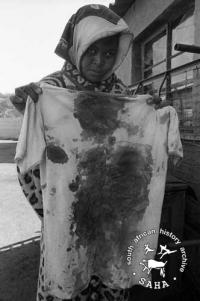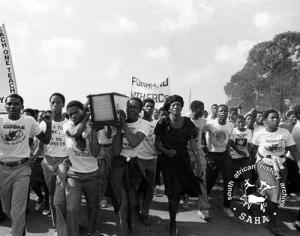 As political resistance heightened in the mid-1980s, the government, through its police and military personnel, responded with brutal force, killing activists. Funerals of victims of political unrests became a rallying point for mass mobilization.
As political resistance heightened in the mid-1980s, the government, through its police and military personnel, responded with brutal force, killing activists. Funerals of victims of political unrests became a rallying point for mass mobilization.
According to Lazarus Mawela:
"Political funerals of activists had an impact in mobilizing the community and brought unity amongst the activists and the community."
To demonstrate their resolve, he continues, they would sing the following song:
'Siyabolalwa (We're being killed, in IsiZulu) and we don't know why.
But we will go on and fight for our liberation. Noma basibolala siya phambili (Even if they kill us, we're marching forward, in IsiZulu).'
Mawela remembers that political funerals attracted members of the community. To support this point, he recalled Flint Mazibuko's funeral:
"One of the funerals was that of Flint Mazibuko. You know, the funeral grew bigger as the procession move[d] along the streets of the township, carrying the coffin. The crowds got bigger. People came out of their houses and join[ed] the funeral procession. And by the time [we] reached the stadium, [we] realized that the attendance was bigger than when we started."



